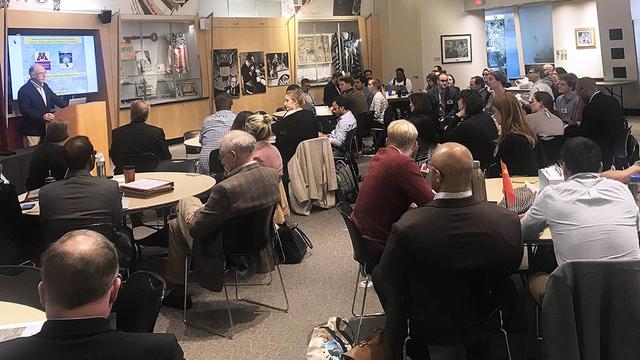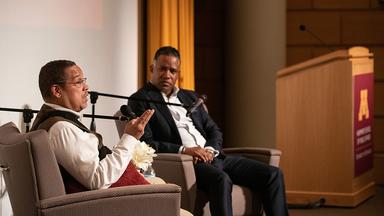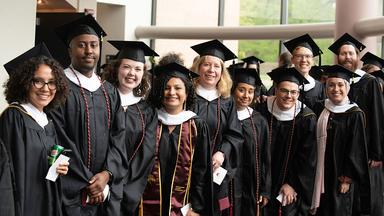Students at the Humphrey School of Public Affairs had a unique opportunity last month to try to resolve a global crisis involving countries half a world away—with the help of some of the country’s most experienced diplomats.
About 45 students from the Humphrey School and other University of Minnesota programs participated in a two-day workshop on international crisis negotiations, which was developed and presented by the U.S. Army War College.
It was an intensive role-playing exercise for the participants, who engaged in a realistic negotiation simulation to tackle a major global challenge; in this instance, a crisis in Kashmir, which is at the center of a territorial dispute among India, Pakistan, and China.
The setting of the exercise was a United Nations summit that brought together key players in the conflict. The students were divided into teams representing those players: China, India, Pakistan, the United States, the United Kingdom, Russia, and a Kashmiri group, the People’s Democratic Party (PDP). A retired Foreign Service Officer or other foreign policy expert mentored each team, providing negotiating and strategic advice.
Mary Curtin, the Humphrey School’s diplomat-in-residence who organized the workshop, says it’s a unique opportunity for students to see how diplomacy works.
“The students gained an understanding of how global actors function in the midst of a crisis,” said Curtin. “It’s important for them to see the complexity of negotiations involving many different players who are working toward competing goals.”
The core phase of the exercise is a series of negotiation sessions among the various players. Each team has to determine which parties to meet with, and what strategies to pursue, to try to make progress toward resolving the conflict.
“The delegations really get into character and you truly feel that you are a part of this situation,” said Izaak Mendoza, a dual MPP/MBA candidate who was a delegate on the United Kingdom’s team. “There are times you feel that your team has significant influence and its strategy is totally on point, only to get blindsided by some advancements that other teams were making in secret.”
The training concluded with a closing plenary session, after which the Army War College leaders evaluated each team’s approach during the exercise.
“Then you start to piece together how the weekend progressed and where your team’s efforts fit into the mix,” Mendoza said. “My biggest takeaway is that solving global challenges is messy, and it’s all about the way you strategically respond instead of react in a crisis situation that keeps you focused on what matters most.”
'Experience the process'
That’s exactly the lesson that the organizers want to impress upon the participants: that negotiating solutions to complex global problems is not easy, and progress is measured in small steps forward.
“The objective is to experience the process, to work through it and understand how to apply the things that you’ve learned,” said Col. Aaron Martin, who led the exercise. “You learn some of this in the classroom, but until you truly try to capture the human element of the individual priorities that are involved in this, you don’t really know what it’s like and how difficult it is.”
The Army War College conducts these negotiation exercises at more than a dozen institutions across the country each year. This is the fourth one hosted by the Humphrey School, and Izaak Mendoza has participated in three of them. A global policy student, Mendoza said these real-world training experiences are good preparation as he plans to pursue a career in the Foreign Service.
“Each year I have participated, I have gotten to network with former diplomats, try out new tactical measures, and flex my interpersonal relations skills on behalf of my team,” he said. “It can be a challenge to find local opportunities for practical global policy application, and these negotiation exercises are some of the most valuable learning experiences I’ve had here at the Humphrey School.”


